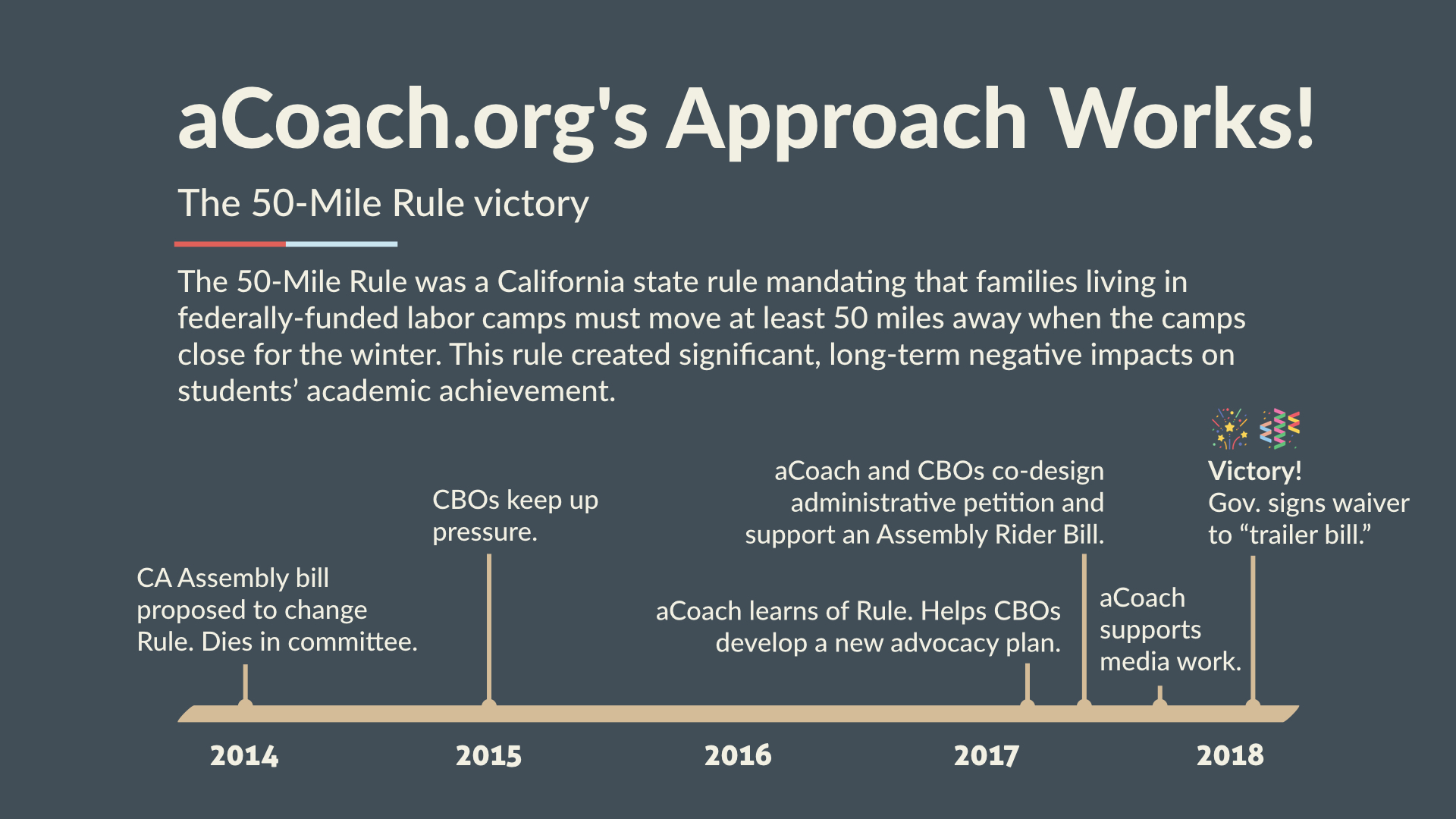For over five decades the 50-Mile Rule forced the families of migrant farmworkers living in state-subsidized migrant housing centers in California to relocate at least twice during the school year. The 50-Mile Rule made it nearly impossible for farmworkers’ children to attend any school for an entire year, challenging their academic progress and disrupting communities. For years, the regulation had made it difficult for farmworker children to earn an education and break the cycle of poverty. Many impassioned and informed advocates campaigned over the years to modify the regulation to allow migrant farmworker children and their families to stay in their school districts and complete their education.
Farmworker advocates and non profits, including the Center for Farmworker Families (CFF) and the Food Empowerment Project (FEP), banded together, drafted online petitions, hosted protests, and sought out audiences with state officials. They were doing everything in their power to change the 50-Mile Rule, but the California Department of Housing and Community Development, HCD, rejected each request.
What Was Missing
What was missing was a way to connect this issue they cared about to the people who could make change happen. When Harry Snyder of aCoach.org joined the team of local advocates, he identified a methodology that could bridge these gaps and streamline a path to success. This meant achieving an established exemption in California law for half the units in the housing centers, allowing many families to remain in their school districts and communities.
Those who worked closely with Harry on the 50-Mile Rule exemption articulated that his contributions were critical and unique. Aggie Ebrahimi Bazaz, a campaign documentarian, praised Harry for his “deep and robust knowledge of policy,” and his proficiency in taking advantage of “avenues for reaching out to legislature.” Julie Solomon, Human Agenda’s Board of Directors’ President, confirmed that Harry had a unique, insider-approach to the law and could clarify the policy change process to augment the expertise of the working team.
The Value of a Different Point of View
Harry’s policy change experience allowed him to see why the old approach to change wasn’t working and how a new pathway for achieving change could include the use of an administrative petition. The approach advocates took is based on the engagement strategy that aCoach.org uses which relies heavily on having an expert understanding of all the different, proven strategies to successfully advocate for change.
The strategy that Harry suggested entails serving communities to harness their communal energy, wisdom and resources with a strategy and helping them achieve their goals for social justice. For the 50-Mile Rule, this meant working with community leaders and the non-profits listed above to ensure that all affected parties had their needs properly met and represented. The strategy also involved developing a specific plan to make a change. Harry and leaders from CFF and FEP, among other advocacy groups, decided the best way to counter the oppressive rule was through creating media and public pressure by filing a formal Administrative Petition authorized by California’s Constitution and laws. This strategy put the spotlight on Governor Brown and his agency, HCD, pressure that they could not ignore.
Generating Media Attention
The public awareness caused by media coverage of the demonstration, confrontation and petition demanding change led State Assembly member Anna Caballero from Salinas to introduce a bill to change the 50 Mile Rule and FEP and CFF supported it. Pressuring Governor Brown and HDC and working to pass Caballero’s bill involved the tireless work of many interested parties, endless campaigning, and taking advantage of all possible political connections. These connections allowed the campaign to advocate for change, demonstrate the benefits the amendment could offer, and describe the importance of taking immediate action.
Often times, campaigns that succeed are those with strong ties both to local organizations and to organizations experienced in policy change. In this instance, aCoach.org was able to support local organizations by providing new strategies designed to address the harm created by regularly forcing families to relocate. It was through aCoach.org’s ability to pressure policymakers from the inside and the outside that we turned local organizations’ claims to policy.
Success!
A 50-Mile Rule exemption was signed as a waiver to the “budget trailer bill” by Governor Brown. This unexpected avenue to success would not have happened without the incredible leadership of FEP and CFF and the communities they represent and adding aCoach strategies to their advocacy arsenal. The exemption allows families with school-age children to request to remain in their migrant farmworker housing centers while their children attend schools. The goal of this policy change from the outset is to help level the playing field, so that migrant families have a chance to break the cycle of poverty. However, the advocacy goals are not fully realized. There is little data about how many families are taking advantage of the exemption or how many centers are publicizing the opportunity.

Why This Approach Works
This case study exhibits that the strategy employed by aCoach.org can help to catalyze real, tangible progress for campaigns that feel stagnant or stuck or to expedite building relationships with stakeholders and policymakers for campaigns that could use a boost in resources or momentum.
As we approach new campaigns and implement the lessons that the 50-Mile Rule has taught us, we plan to include better mechanisms to monitor the success of our campaigns. We want to be able to declare success where it is representative, and reevaluate for further action when successes are incomplete. This will help ensure steady progress towards increasing equity and social justice.
Let's create a case study for when your campaign succeeds.
Ready to build important skills, start mastering the policy change process and achieve the change your community needs?
Getting started is easy...
Share some details about your campaign idea and schedule a 15-minute call with an advocacy coach to develop your initial advocacy plan.
